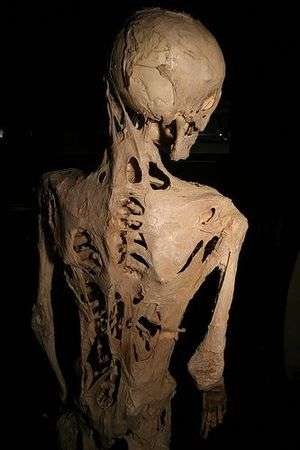Harry Raymond Eastlack
| Harry Raymond Eastlack, Jr. | |
|---|---|
 Skeleton of Harry Eastlack, now in the Mutter Museum in Philadelphia, Pennsylvania. | |
| Born |
November 1933 Philadelphia, Pennsylvania, USA |
| Died |
November 1973 Philadelphia, Pennsylvania, USA |
| Cause of death | Pneumonia |
| Known for | Suffering from Fibrodysplasia ossificans progressiva |
Harry Raymond Eastlack, Jr. (1933–1973) suffered from fibrodysplasia ossificans progressiva (FOP), a rare and poorly understood disease in which the bone repair mechanism runs out of control, turning other tissue like muscles and tendons into bone. Eastlack permitted his skeleton to be preserved for scientific research, and it is today on display at the Mütter Museum of The College of Physicians of Philadelphia. His skeleton is one of the few existing in the world and a valuable asset to the study of the disease which is supported by the International FOP Association.[1]
At age 5, he broke his left leg while playing with his sister. There were complications with the fracture, which did not set properly. The hip and knee stiffened and bone growths began to develop on the muscles of his thigh. Within some years the condition spread to other parts of his body, ossifying his tendons and muscle and fusing his joints. By his mid-20s his vertebrae had fused together.[2] He died from pneumonia in November 1973, six days before his 40th birthday.[3] At the time of his death his body had completely ossified; even his jaw locked up, leaving him able to move only his lips.[4]
Harry Eastlack is referred to in the movie Tell Tale as Harry Erlich.
References
- ↑ "The Skeleton of Harry Eastlack". IFOPA. Retrieved 9 February 2016.
- ↑ Angier, Natalie (April 27, 2009). "Bone, a Masterpiece of Elastic Strength". The New York Times. Retrieved 9 February 2016.
- ↑ Maeder, Thomas (February 1998). "A Few Hundred People Turned To Bone". The Atlantic. Retrieved 9 February 2016.
- ↑ "Harry Raymond Eastlack, Jr.". Find-A-Grave. Retrieved 9 February 2016.
Further reading
- Kaplan, Frederick S. (2013). "The skeleton in the closet". Gene. 528 (1): 7–11. doi:10.1016/j.gene.2013.06.022.
External links
- Ciach, Brian. "Collective Uncommon, II. The Progressive Ossification of Harry Eastlack". Retrieved 9 February 2016.
- Lambert, Katie. "How Fibrodysplasia Ossificans Progressiva (FOP) Works". Retrieved April 27, 2009.